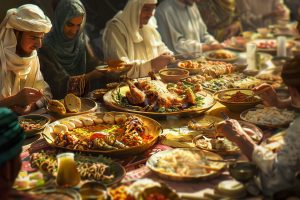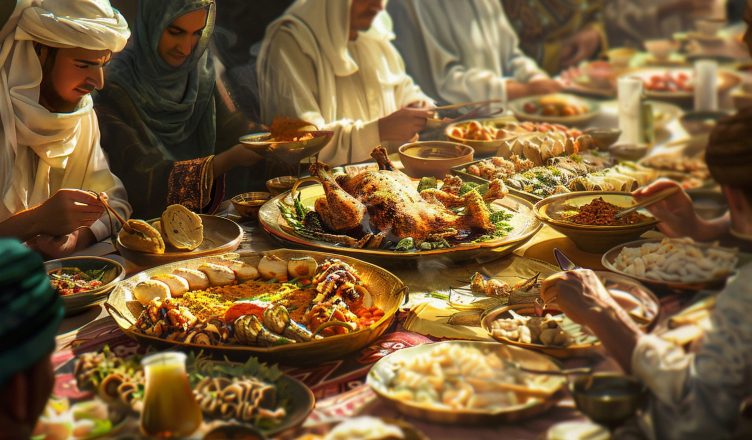Islamic festivals are celebrated by Muslims worldwide, marking significant events in the Islamic calendar. These festivals bring people together, fostering a sense of community and preserving rich traditions. Let’s explore some unique ways different cultures celebrate Islamic festivals and their importance in maintaining these traditions.
What Are Islamic Festivals?
Islamic festivals, or Muslim festivals, are religious celebrations that hold great significance in Islam. They often involve prayers, fasting, charity, and feasting, reflecting the core values of the Islamic faith. Here is an Islamic festival list of the most prominent ones:
- Eid al-Fitr: Celebrated at the end of Ramadan, the holy month of fasting.
- Eid al-Adha: Commemorates the willingness of Prophet Ibrahim (Abraham) to sacrifice his son in obedience to God.
- Mawlid al-Nabi: Marks the birth of the Prophet Muhammad.
- Islamic New Year (Hijri New Year): The beginning of the new Islamic calendar year.
- Ashura: Observed on the 10th day of Muharram, particularly significant for Shia Muslims.
Unique Celebrations Around the World
Eid al-Fitr in Turkey

In Turkey, Eid al-Fitr is known as Ramazan Bayramı. The celebration begins with a special prayer at the mosque, followed by a festive breakfast with family and friends. Traditional sweets like baklava and Turkish delight are shared, and it is customary for younger people to visit elders, offering respect and seeking blessings. This practice helps preserve the importance of family bonds and respect for elders.
Eid al-Adha in Indonesia
Eid al-Adha, or Idul Adha in Indonesia, is marked by the ritual sacrifice of animals such as goats and cows. The meat is distributed to the poor, symbolizing charity and community support. The day starts with a communal prayer, and families gather to prepare and share a meal together. In some regions, traditional dances and music performances add a cultural touch to the celebrations.
Mawlid al-Nabi in Egypt
In Egypt, Mawlid al-Nabi is celebrated with vibrant street processions, featuring chanting and recitations of poetry in praise of the Prophet Muhammad. Sweets called “halawet el-moulid” are sold in markets, and people gather in mosques for special prayers and sermons. This festival helps to keep alive the oral traditions and communal spirit of the Egyptian Muslim community.
Islamic New Year in Malaysia
Malaysia marks the Islamic New Year, or Maal Hijrah, with various cultural and religious activities. The day is observed with public prayers, Quran recitations, and religious lectures. Parades and cultural performances showcase Malaysia’s diverse heritage, blending Islamic practices with local traditions. This festival emphasizes reflection on the past year and the importance of spiritual growth.
Ashura in Iraq
In Iraq, Ashura is a particularly poignant observance for Shia Muslims. It commemorates the martyrdom of Imam Hussein, the grandson of the Prophet Muhammad, in the Battle of Karbala. The day involves mourning rituals, reenactments of the battle, and communal prayers. People gather to recite poems and narratives that recount the events of Karbala, preserving the historical and spiritual significance of Ashura.
The Importance of Islamic Festivals
Islamic festivals play an important role in preserving cultural and religious traditions. They:
- Strengthen Community Bonds: These festivals bring people together, fostering a sense of unity and belonging. Celebrations often involve communal prayers, meals, and charitable acts, reinforcing the importance of social solidarity.
- Pass Down Traditions: Through rituals, storytelling, and traditional practices, Islamic festivals help pass down cultural and religious knowledge from one generation to the next. This ensures that the values and teachings of Islam are preserved and respected.
- Promote Spiritual Reflection: Many Islamic festivals encourage introspection and spiritual growth. They provide opportunities for Muslims to renew their faith, seek forgiveness, and engage in acts of worship and charity.
- Celebrate Diversity: While the core elements of Islamic festivals are universal, the ways they are celebrated can vary widely. This diversity showcases the richness of Muslim cultures around the world, highlighting the different ways communities express their faith.
Islamic festivals are more than just celebrations, they are vital in maintaining the cultural and religious heritage of Muslim communities worldwide. By observing these festivals, Muslims reinforce their faith, build stronger communities, and ensure that their rich traditions continue to thrive.
